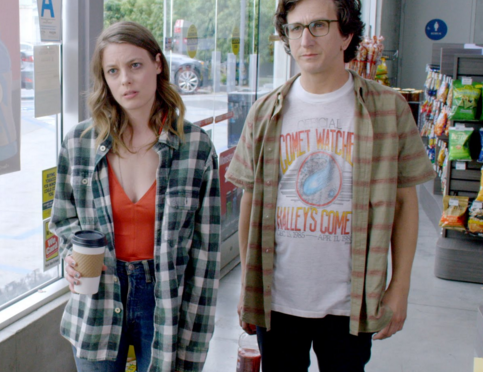There’s no denying that Paul Rust is having a moment right now. Seemingly rising out of nowhere from the ranks of the Upright Citizens Brigade Theater in Los Angeles (the Second City of the twenty-first century), Rust grabbed a major screenwriting lifeline in the form of his Netflix relationship, which began with the highly polarizing fourth season of Arrested Development. From there, it seemed Rust was destined for a seamless transition into a dream writing career that has now brought us to his Netflix series, Love.
The show co-stars Gillian Jabobs as Mickey Dobbs, the addictive, chip-on-her-shoulder broad who makes the faux pas of acting aloof in the beginning toward Gus Cruikshank (Rust)–which is a rookie mistake, as the person less into it always becomes the person more into it. And, for as ambitious and all-encompassing of a title as Love is, the narrative thus far does seem to cover the gamut of stages, from breakups to the first initial pangs of affection. Rust’s wife, Lesley Arfin (who also unfortunately wrote for Girls, but let’s try to ignore that), along with Judd Apatow, co-created Love with an essential theme in mind: “So I just keep believing in this lie that a relationship evolves and gets better and–why do I believe that? Where do these lies come from? And it’s like, oh, I know, songs and books and, you know, movies. All these movies I’ve watched, they’re not real. They’re lies… Pretty Woman? Pretty Woman is such a lie. Like, a prostitute wouldn’t fall in love with you. She would just, like, steal your shit and sell it for coke.”
Gus’ tirade, which he goes on after accidentally giving Mickey the address to his ex-girlfriend’s, Natalie (Milana Vayntrub), in the wake of Mickey cajoling him into getting high shortly after they meet at a convenience store, is, essentially, the entire thesis for how “millennials” function now. Not only are there fewer and fewer happy ending rom-coms to feed them a steady diet of so-called lies, but, without the same obligations and societal demands as their forebears, they are so terribly confused and reluctant about committing to anything–because why would they? Where’s the pressure to do so? And while this can often border on being a source of annoyance in Love, the writing and execution is rendered in such a manner as to bring an undeniable authenticity to it (the kind that’s extremely lacking in Girls). Indeed, one of the most unique aspects about the structure is how slow the pace is. Rather than starting out right away with Mickey and Gus meeting, getting together and encountering the inevitable staleness after the dalliance begins, we’re romanced by their characters as individuals: Gus is an on-set tutor for a WB-esque (it will never be the CW to me) supernatural show called Witchita with aspirations of writing for it, while Mickey is a reluctant program manager for a satellite radio show featuring Dr. Greg (Brett Gelman), a sort of Dr. Drew wannabe who helps callers with their romantic issues.
Each character’s profession reveals distinct traits about their personalities. In Gus’ case, it’s that he’s so desirous of peace at any price that he lets the child star of the show, Arya (Iris Apatow, Judd’s daughter, obviously), have her way most of the time–so much, in fact, that he cheats on her state exam for her so that she can pass and keep working on Witchita. Where Mickey is concerned, the effortlessness of her job allows her to persist in her addictive behavior outside of work, from drinking to having sex with her coke fiend semi-boyfriend, Eric (Kyle Kinane). It is only when the threat of losing her position as a result of what she believes is Dr. Greg’s sexually harassing vibes that she tries to fight for it by sleeping with him so that she can later hold it against him. Upon telling him that now he can’t fire her, Dr. Greg is horrified that she thinks he was trying to threaten her into boning him. It’s at this point that Mickey is given some particularly unwanted insight into her nature.
Feeling that Gus might be her salvation–a way for her to be better–she eventually gives in to going out with him. Gus, on the other hand, sees Mickey as the type of “cool girl” that will provide him with just the sort of adventure his life needs. With each one buying in to a certain preconceived notion of the other, it’s only inevitable that disaster and heartache will ensue.
Like real love itself, the show is painful, awkward and filled with a lot of waiting that prompts frustration and therefore irrational behavior. If this is the love of the future, we may all need to invest in Woody Allen’s Orgasmatron.






















